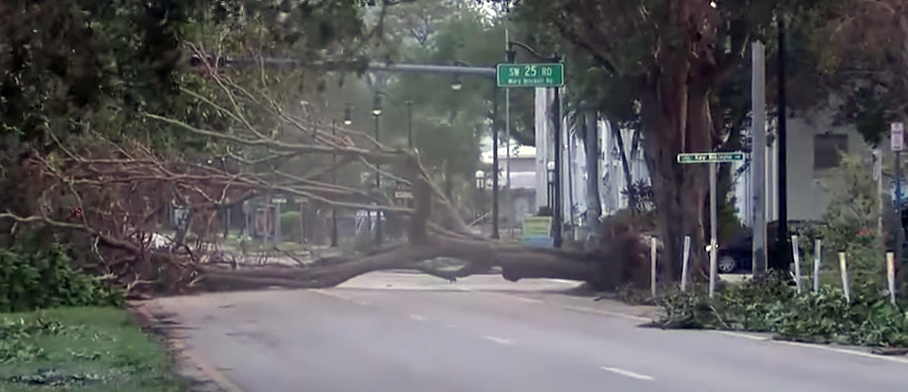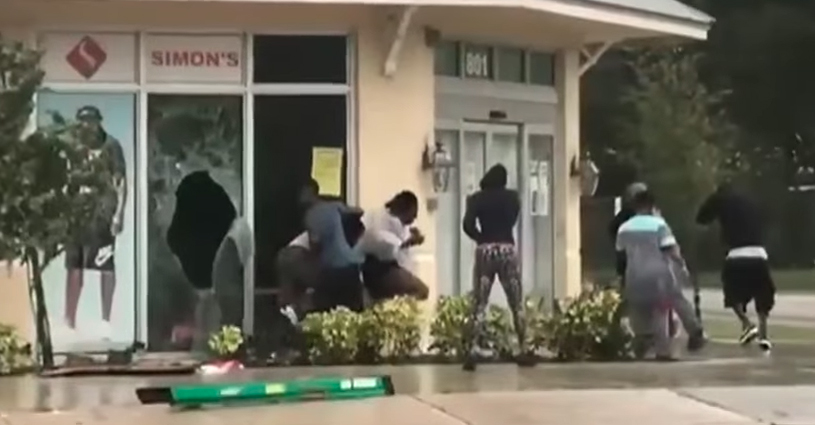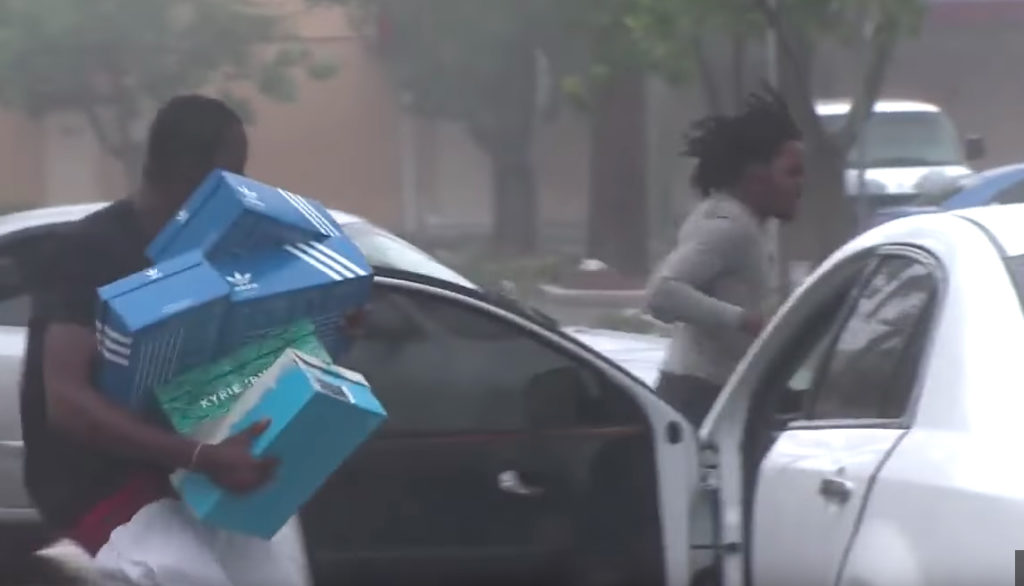Living in Florida certainly has a lot of perks with the beautiful weather and architecture, easy access to the ocean and many different fresh water lakes. This is just a short list, but if you were to ask a Florida resident what he or she dislikes the most about living in Florida, you’d probably hear the answer ‘hurricanes’.

When Floridians think of hurricanes, the first things that come to mind are:
- Lots of Shopping: As soon as a Florida resident gets the warning from the local news team that a hurricane is on its way – off to the hardware store to get plywood, generators, flashlights, buckets and other items to prepare for all aspects of the storm – before, during and after. Next, is the grocery store where it’s a race to get the bare essentials (i.e. canned goods, water, bread and anything that does not need to be refrigerated or cooked on a stove or in an oven).
- Prep Work at Home and the Office: Putting up the shutters; filling up the bathtub with water; putting away anything loose on the exterior of the home or office (i.e. patio furniture, trash cans, lawn décor, signage, tools, equipment and anything that can become airborne during the hurricane).
- Shut-in throughout the Storm: Some residents choose to leave the area during a hurricane. However, many of the people who attempted to flee during Hurricane Irma ended up caught in stopped traffic along the interstate which resulted in chaos and misery. Nonetheless, for those who remain behind, it’s difficult to endure being shut inside a home during the storm.
- Post-Hurricane: Once the storm is over, all are left with what the storm has left in its path. The power is out, cell phone towers are down, vegetation debris and trash are everywhere and must be maintained and, most likely, there is no gas or cash available. A majority of businesses are closed and everything feels very ‘third world’ for a while.
The items described in the bullets above are just some of the aspects of dealing with Florida hurricanes. In addition to being confined to a home for several days; losing power and having to spend large amounts of money throughout the entire ordeal, there will be many residents without work after a hurricane for anywhere from days to months (depending upon their professions). And countless residents will experience major or complete damage to their homes and businesses.

Needless Hurricane Crime
Natural disasters always encourage neighbors and communities to work together like no other times. Unfortunately, these types of negative events also encourage criminals and residents of depressed communities to take advantage of the vulnerable in such disastrous circumstances.
It’s smart to include measures within your hurricane prep to guard your home and/or business from crimes that are common before, during and after hurricanes and other natural disasters.
Below are some of the hurricane crimes that happen:
Curfew Violations: Curfews are often implemented around hurricanes for numerous reasons, but mostly to prevent crimes, injuries and death. Anyone who is found ‘out and about’ during a law enforced curfew will be taken to jail. Violating curfew laws during a hurricane is considered an ordinance violation.
Property Crime – Burglary / Looting / Destruction: While honest business owners and good citizens are home dealing with the hurricane, less honest individuals and gang members take that opportunity to break into retail stores and other businesses to steal items for sale, furniture, equipment and whatever valuable goods they can get their hands on. For example, in Miami, during Hurricane Irma with deadly winds, looters broke into various vacant stores with sledgehammers and helped themselves to items for sale, such as clothing, shoes, computer laptops and more. Also, in Orlando, a sporting goods store was broken into and the thieves were in the process of stealing firearms until a witness notified the police. A SWAT team arrived in time but were forced to use tear gas to stop the criminals. Some business owners reported their properties were completely destroyed by the break-ins.

In Palm Beach County, the School District invited local evacuees to use their gyms as emergency shelters. However, the number of evacuees at Seminole Ridge High School exceeded the size of its gymnasium. Therefore, the classrooms were opened to house those who needed a place to stay. Nonetheless, desk and filing cabinet locks were picked and classroom equipment and supplies were stolen by those they invited to stay
Rape and Sexual Assault: Although it’s not something any of us want to think about, during war or any type of mass destruction within a community when turmoil is at a maximum and law enforcement is no longer able to maintain control, those who are most vulnerable (i.e. women, children, the elderly) are at danger of abuse, including rape and/or sexually assault.
Some of the worst crimes following a deadly hurricane in the United States were endured and witnessed after Hurricane Katrina in 2005 in New Orleans. Those who were unable to evacuate the area before the storm and were waiting five days for help to arrive confessed to conditions they described as ‘hell on earth’. The crime was so bad that the first priority of implementation by rescue crews was a temporary booking and detention center to incarcerate the criminals who were accused of looting, harassing, murdering and raping those who were already fending for their lives in the hurricane aftermath.
According to officials in Houston, Texas, crime in their city escalated after 150,000 of the New Orleans evacuees relocated to their city. Houston law enforcement discovered much of the problem was from gang members who were (pre-hurricane) living on the streets in New Orleans.
People out on the road when told not to: After a hurricane or any type of natural disaster, it is extremely important to keep the roads clear for emergency response teams to provide the help that so many need following the calamity. Still, in almost every circumstance, regardless of how many times the local authorities and news media mention it on television, radio and (if possible) online, it never seems to prevent people from getting out on the roads. Not only does the crowding on the streets prevent rescue teams from doing their jobs and helping those who truly need help, but it also puts everyone in a higher risk of danger.
When drivers and pedestrians are populating roads and areas outdoors before the areas are assessed by highly skilled professionals, they are taking great risks of injuring themselves or their loved ones. Electrical wires may be down and in harm’s way. Wildlife may be running loose in flooded areas (including dangerous creatures, such as alligators, snakes and more). Traffic lights are not operating causing major congestion on the roads which add to the problems with a long list of vehicle accidents and blocking emergency crews from getting where they need to go.
Staying safe at home and off the roads is one of the most helpful things you can do after a hurricane. Police, paramedics, utility workers and other professionals who are trying to help the community highly rely on the cooperation of its citizens.
Planning Ahead Before the Storm
Although meteorologists and the local news teams do their best to inform us about hurricanes before they make land, no one truly knows how intense a storm will be. History repeats itself. And time and time again proves some of the worst people will always take advantage of opportunities to rob, destroy and assault defenseless, innocent people and their property if given the opportunity.
The smartest thing to do to protect you, your family and your home after a hurricane is to plan ahead of time. The first thing to keep in mind is that when life’s circumstances change, people change. For example, the way someone behaves when they are not hungry or thirsty will be completely different than when that same person hasn’t eaten or had anything to drink for long periods of time. The local police here in South Florida have mentioned the noticeable difference in behavior of the people when forced to live without electricity for several days. Negative behavior begins to increase simply from not having lights, refrigeration or air conditioning. Imagine how the mindsets of the people will worsen when hungry and dehydrated.
In the United States, we have it very good compared to many other places in the world. Even the poorest of our people have it much better than those living in North Africa, Haiti and a long list of other countries. When privileges we take for granted each day are removed, we find out who we really are. As for people who already have difficulty fitting in with society, adding such toxic circumstances to the equation is downright scary.
Tips to Protect You, Your Family and Home from Crime After a Hurricane
- Be smart. Do not allow anyone to handle a gun or other weapon unless the person is licensed and well educated on how to use it
- Keep a safe on-hand to hold cash, prescription drugs, guns and ammunition. By having a safe, it will help to prevent children from accessing weapons and medications. It will also help to prevent problems while guests are staying with you.
- Obey curfew laws at all times. Curfews are implemented to protect the citizens in the area. When curfews are ignored, you are only endangering yourself and those around you.
- Lock all doors and windows when evacuating a home or business. If it’s possible to add extra locks – even better.
- Cover all windows when evacuating a home or business, so no one can see inside.
- Remain in groups from beginning to end. It’s better to stay with friends or family throughout the entire storm. This includes before, during and after the storm. By staying in groups, no one is vulnerable.
- Stay off the roads until your local news media tells you it’s safe to do so.
- Stock up on groceries, pet food, water, gas, cash, tools, ice, medicine, first aid kits and whatever you can keep on hand to prevent you or anyone in your group from having to leave your home until things have calmed down, roads have cleared and the situation has improved.
If someone you care about has been arrested during a hurricane in Florida, Bail Bonds Now is here to help. We have bail agents all throughout the state standing by. All of our offices are open 24/7, 365 days per year. In the event of a hurricane, we strive to do whatever we can to meet the needs of our clients. Call or text a bondsman at (786)-500-9999.


 Serving all of Florida,
Serving all of Florida, 
Recent Comments